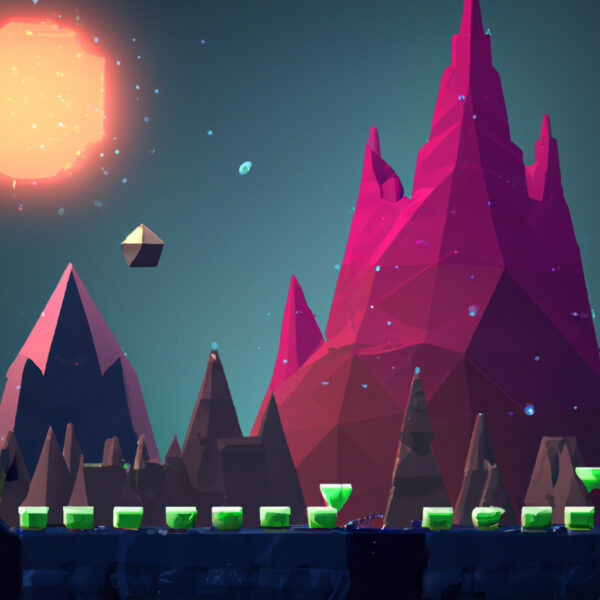Virtual reality is a term we often hear buzzed about in the tech industry, from gaming to healthcare. This technology promises to transform not only the way we entertain ourselves, but also how we work and learn. But what exactly is virtual reality? In this article, we delve into the fundamentals of VR, discuss why you should learn this revolutionary technology, and present some exciting learning resources to kickstart your VR journey.
Table of contents
What is Virtual Reality?
Virtual Reality (VR) is an immersive technology that simulates a digital environment. Using VR headsets and motion sensors, users are transported from the real world into a simulated one. This high-end simulated experience entails pose tracking and 3D displays, creating a lifelike virtual world.
The term “virtual reality” was first coined in 1987 by Jaron Lanier. However, the genesis of VR can be traced back to artists and entertainers who created immersive experiences through paintings, panoramas, and 3D movies. Virtual reality can be a broad term encompassing other immersive technologies like Augmented Reality (AR) and Mixed Reality (MR), which all fall under the Extended Reality (XR) spectrum.
Why Learn Virtual Reality?
Virtual Reality has evolved from a futuristic concept to a present-day reality. Here are some compelling reasons why learning VR could be a game-changer:
- Top-Tier Industry Demand: VR applications are not limited to gaming. Industries like education, healthcare, architecture, and real estate are keen on integrating this technology into their operations.
- Exciting Career Prospects: By learning VR, you propel yourself towards a future-proof career path. With the increasing demand for VR specialists, your skills will always be sought after.
- Innovative and Challenging: Working with VR technology allows you to push the boundaries of what’s possible, challenging you to solve problems creatively.
The Role of VR in Today’s World
While Virtual Reality is often associated with gaming and entertainment, it’s worth understanding the diverse ways this technology is reshaping our world. VR is currently revolutionizing several industries, and its potential is limitless.
- Education and Training: Educational institutions and corporations are utilizing VR for immersive learning and training experiences. From virtual field trips to simulated surgeries for medical students, VR is revolutionizing the way we learn.
- Real Estate: VR allows potential homebuyers to tour homes virtually, reducing the need for on-site visits and saving time for both clients and realtors.
- Therapeutic Applications: In healthcare, VR is being used in therapy and rehabilitation, providing controlled environments for patients to carry out exercises, and for treating conditions such as post-traumatic stress disorder.
- Design and Architecture: Architects can create virtual mock-ups of their designs, allowing clients to experience the designs in a full immersive space, aiding decisions and understanding.
As we continue to explore and innovate with Virtual Reality, it is becoming abundantly clear that this technology will play a significant role in the future of various industries. It’s an exciting time to dive into the world of VR and contribute to this technologic revolution!
How to Get Started with Virtual Reality
Embarking on your journey to becoming a virtual reality specialist may seem daunting at first, but fret not, we’ve got you covered. Here are some general steps to help get you started on your VR adventure:
- Understand the Basics: Start by familiarizing yourself with the fundamentals of VR, such as its history, terminologies, and applications.
- Learn VR Programming: Dive into VR development by learning a programming language like C#. Grasp the syntactical elements, control structures, and typical programming constructs.
- Explore VR Platforms: Get comfortable with VR platforms and engines like Unity and Unreal Engine.
- Create Projects: Make sure to apply what you learn by creating your own VR projects. This helps solidify your knowledge and gives you hands-on experience.
- Stay Updated: VR is a rapidly evolving field. Make it a point to stay updated with recent developments and industry trends.
Now that you have an idea of where to start, you may be looking for comprehensive, beginner-friendly resources. That’s where we come in.
At Zenva, we offer an immersive, beginner-friendly Virtual Reality Mini-Degree. It is designed to help you master the essential concepts of VR development.
Our Virtual Reality Mini-Degree offers hands-on practice with project-based learning. You will be creating VR applications, interactive game experiences, and understanding key VR concepts.
The best part? Our curriculum has been specifically crafted for beginners. You don’t need any prior coding or VR experience. Our resources and support will guide through every step of your learning journey. So why wait? Start your VR learning journey with us today!
Learning Resources
For those who are eager to start their journey into the world of VR, here are some comprehensive and approachable resources to guide you:
Virtual Reality Mini-Degree
The Virtual Reality Mini-Degree offered by Zenva Academy is an immersive program covering essentials in VR development. This course includes:
- Practical skills in building virtual reality applications using Unity
- Coursework in VR fundamentals, VR controllers, avatars, and more
- Industry application, leading to career opportunities in various sectors such as gaming, healthcare, education, and real estate
- A certificate of completion generates on successful completion of the program
VR Game Development 101 – Interaction Fundamentals
Grasp the basics of creating virtual reality projects in Unity using the XR Interaction Toolkit with this free course provided by Zenva. The VR Game Development 101 – Interaction Fundamentals course features:
- Insight into creating VR-oriented Unity projects and making objects interactable
- Lessons on how to install the XR Interaction Toolkit and configure an XR Rig
- 0.6 hours of video content, a certificate of completion, and closed captions
How to Make a VR Game
The GameDev Academy provides a valuable tutorial, How to Make a VR Game, covering:
- The basics of VR and the different types of VR experiences
- Different methods of VR movement, including teleportation and smooth movement
- Introduction to VR game creation using popular game engines like Unreal Engine and Unity
Create a Rhythm Game with the XR Interaction Toolkit
Zenva offers an opportunity to dive deeper into Unity’s XR Interaction Toolkit with the course Create a Rhythm Game with the XR Interaction Toolkit. This course includes:
- Step-by-step guidance on creating your first rhythm game
- Tutorials on setting up note blocks, creating animations, and tracking scores
- Essential training on creating tracks with beat markers
An Introduction to Virtual Reality
In An Introduction to Virtual Reality on GameDev Academy, you can learn the nitty gritty of VR before jumping into projects. The short webclass helps you:
- Understand what virtual reality is – and how this compare to augmented reality and mixed reality
- The popular VR devices available and how development for them works from a high-level overview
WebVR A-Frame Course
With this WebVR A-Frame Course on Zenva Academy, you can familiarize yourself with the world of VR web development. This course equips you with:
- Knowledge about building VR web applications using A-Frame’s HTML-like syntax
- Techniques on incorporating 3D objects, animations, and more into your VR web applications
How to set up Unity for VR Rigs and Hand Controllers
How to set up Unity for VR Rigs and Hand Controllers from GameDev Academy goes over how to prep a VR project for sets with handcontrollers. The tutorial covers:
- Setting up a VR project – including models
- Incorporating hand controllers and testing them in the project
What is Virtual Reality – Wrap-Up
Jumping into the field of Virtual Reality can undoubtedly open doors to a multitude of opportunities impacting many industries. As technology progresses and becomes more deeply integrated into our everyday lives, possessing knowledge of VR development becomes increasingly valuable. Don’t let the vastness of the field overwhelm you; instead, view it as an exciting challenge with endless learning opportunities.
In a world where technology is constantly evolving, it’s crucial to stay ahead of new and emerging trends. Virtual Reality is one such trend that’s poised to change our lives dramatically. It’s no longer a technology of the future—it’s here, and it’s changing the way we experience the digital world.
The journey of becoming a VR specialist can be an exciting venture, filled with challenges, learning, and satisfaction. Every new concept you learn, every project you build, gets you one step closer to becoming adept in VR, a skill that could define your career.
We wish you all the best in your learning journey! No matter where you are in your learning path, remember, it’s perseverance and passion for learning and growing that lays the foundation to achieving mastery. As you embark on this exciting journey, Zenva courses like our Virtual Reality Mini-Degree are here to guide you every step of the way, providing you with valuable knowledge and practical experience in the field of VR. You’re just one click away from starting this empowering journey. Happy learning!
Did you come across any errors in this tutorial? Please let us know by completing this form and we’ll look into it!

FINAL DAYS: Unlock coding courses in Unity, Godot, Unreal, Python and more.







